Text
66 Opera Arias
I have been furloughed for couple of weeks now, leaving the house only very occasionally. Maybe by the time pandemic passes, I will have finished this project. Tonight I was supposed to be at the Royal Opera, instead I’m at home doing this.
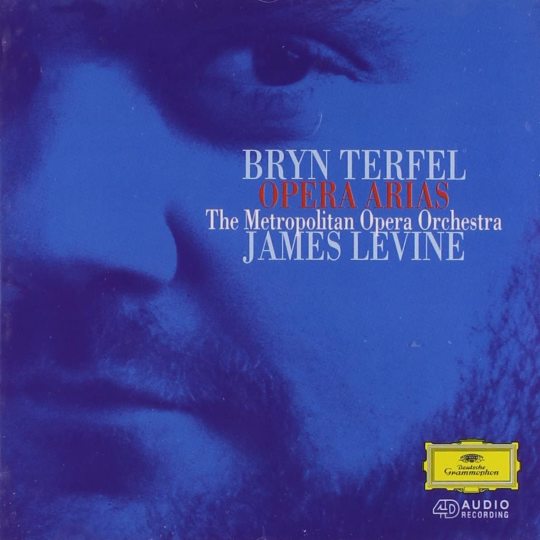
This is very 1996.
The Metropolitan Opera has been offering their back catalogue as daily streams over the past couple of weeks, and continue for at least another week; it’s been a tiny bit of hit and miss for me, but the absolute highlight was the Robert Lepage Ring Cycle, starring among others Bryn here. And Deborah Voigt, who I think will crop up in this project later on. Having watched the Ring Cycle and having listened to this album, I feel like I have to say this: Fuck you, James Levine. You were the greatest opera conductor in the world, and you had to fuck it up. It’s horrible and unforgivable, and it’s a huge loss. You should have done better. Been better. You owed it to everyone. That’s all I’ll say about the subject; Levine will almost certainly come up again during this project, and I don’t want to touch this again.
This album, released in 1996, is not Terfel’s first recording. In fact, technically, this doesn’t even qualify as an early one (he famously finished second behind Dmitry Hvorostovsky in the Cardiff Singer of the World in 1989) - before this, he had already participated in a number of complete opera recordings, and published a number of solo discs, featuring everything from English song to Broadway tunes. This album sits chronologically at an interesting place - in the mid-1990s he was starting to move on from the Mozart that had made him famous to bigger, heavier roles, and the way the 14 tracks on this disc are organised, reflects that. This is a showcase - here’s what I can do, and here’s where I’ll go - and it works.
Favourite track: I’m still in the Wagner headspace, so I’m picking no. 7, Die Frist is um, from The Flying Dutchman. About as good as it gets.
Opera Arias
Bryn Terfel, baritone
The Metropolitan Opera Orchestra
James Levine, conductor
0 notes
Text
65 A song in my heart
I appear to have unseasonably many CDs by Bryn Terfel.
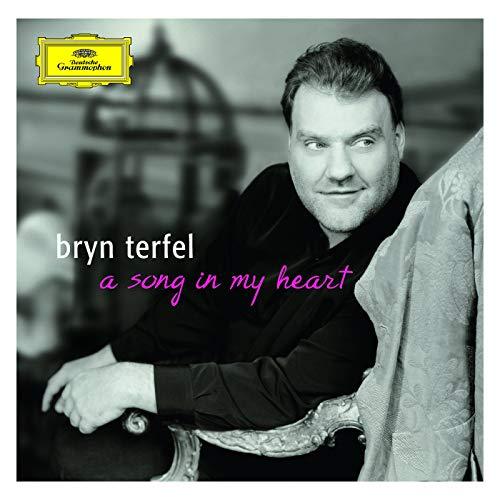
Surprisingly timeless cover (this album is from 2007), tho I’m slightly mystified by the Cherubino chair/coat set up here.
Bryn Terfel is another artist who has stayed with the same label (this case Deutsche Grammophon) throughout their career, making this sort of two-disc, bit of everything Best of compilation possible. The selection of music goes from folkish American (Shenandoah) to English song (Silent Noon) to Wagner to Handel to Welsh hymns (Cwm Rhondda). Although the material is not in order according to the date of recording, this is a fairly good look into Terfel’s development as an artist, from the Mozart of the early days to the Wagner of his prime.
I confess : whenever I have seen Terfel live, he has fallen short of my expectations. Everything on this album sounds great, and who could forget his career defining appearance as Wotan at the Met Ring Cycle 2011? Maybe the mistake that Terfel has made in the recent years has been to pick roles that are sung traditionally by a bass, such as Boris Godunov, and to which his fairly bright baritone doesn’t necessarily do justice? There are no such issues here though - everything is well performed, in good voice, with consistently great sound quality. Again, as with many compilations, this does encourage you to seek out the original recordings more than compel to listen to itself again, even if the structure is a lot more appealing than on many similar discs.
Favourite track: There are a lot of great tracks on this album. I love no.1 on disc 2, Si, tra i ceppi from Handel’s Berenice (am I becoming a Handel fan?!), as well as all the Mozart on disc 1. Made to choose, I’d probably pick either Schubert’s Erlkönig (disc 1, no. 11), or either of the Wagner arias on the second disc, Die Frist ist um (no. 9) or O du mein holder Abendstern (no. 10).
A Song in my Heart
Bryn Terfel, baritone
Various orchestras, conductors, and pianists
0 notes
Text
64 Winterreise
The great German song cycle in its second appearance. Spoiler: there will be couple more.

This cover is topical.
Hermann Prey was the second German baritone, a near-contemporary of Dietrich Fischer-Dieskau; their repertoires were near identical and while Prey was immensely successful, he probably never quite managed to step out of the shadow of DFD. When I was starting to get into Lied, I rebelled and sought out Prey over Fischer-Dieskau, and stand by my decision to this day.
Spotify tells me that like DFD, Prey recorded this cycle more than once, and a quick comparison reveals that this version with Wolfgang Sawallisch is not the best - Spotify has five different recordings by him, with five different pianists, and having listened the same song in all of them, I prefer the version with Irwin Gage the best. Still, there’s nothing wrong with this one either - in fact, this is a mini masterclass on how to sing Lied. The diction is perfect, and there’s an unsentimental crispness to his singing, meaning this has aged remarkably well. I might prefer a slightly slower tempo, but that’s just a matter of personal taste.
Franz Schubert - Winterreise
Hermann Prey, baritone
Wolfgang Sawallisch, piano
Available on Spotify with a cover different from the one above.
A bit of homework: contemplate the fact that Prey recorded this piece at least five times during his career, while Fischer-Dieskau manage to record it a whopping seven times. Of the modern Winterreise obsessives, only Ian Bostridge has done more than one recording. Are the times when one could follow artist’s development, and the development of their relationship with particular piece of music, over in that sense? This question will become relevant again later in this journey.
0 notes
Photo
Interrupting the regular service with this insight.
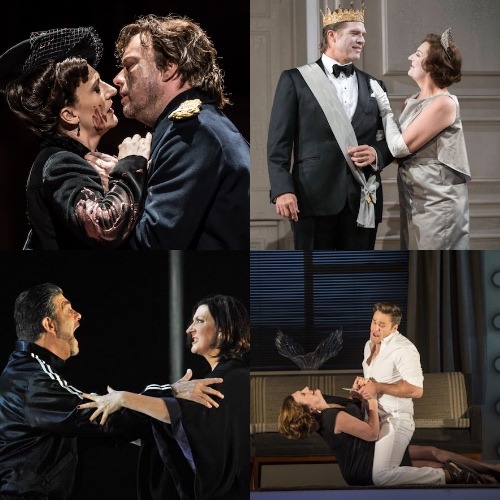
It has just occurred to me that when she is not in a trouser role, Sarah Connolly is arguably typecast as an incestuous middle-aged wife.
16 notes
·
View notes
Text
63 Opera Arias
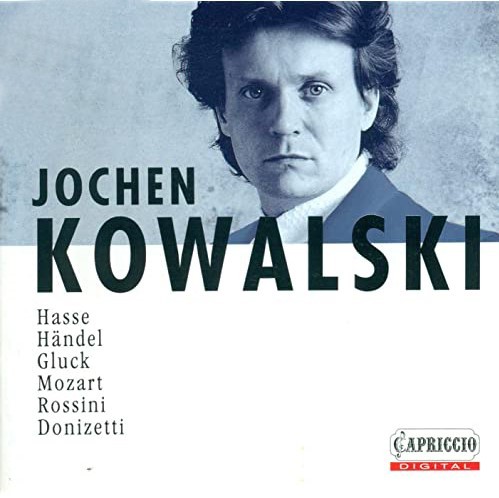
As a general sort of rule, I’m not super into countertenors, and prefer roles like Giulio Cesare or Orfeo to be sung by mezzos, so it’s a bit of a mystery where or when or how I became a low key fan of Jochen Kowalski. I suspect it may have had something to do with Die Fledermaus - Kowalski has been one of the few countertenors to successfully take on the Russian count and make it his own.
Kowalski was a native of DDR, and has recorded quite a bit for German labels; much of his output is typical countertenor fare - baroque sacred music and opera, German song, with some slightly ill-judged lounge classics thrown in the mix (I guess he had fun and got paid). These days if I want myself some Kowalski, I tend to head to Youtube, as he is actually a very charismatic stage animal, and entertaining to watch; this album is very accomplished and the selection of music is well thought through, but as a whole a bit, erm, dull. Which betrays the reason why I prefer mezzos for the same repertoire - countertenors to my ear have fewer colours in their arsenal, and while they, including Kowalski, have a lot of power and strength, the 11 tracks of this all sound a bit samey, which may also be the fault of the conductor, who doesn’t bring many stylistic variations to the table. Spotify played after this from Kowalski’s Handel album, recorded with a chamber orchestra specialising on baroque, and it made for a whole lot better, more interesting listening, and I really recommend that over this.
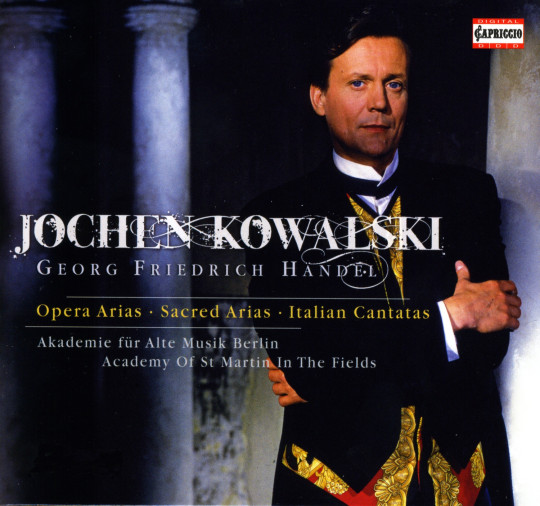
Favourite track: Kowalski’s voice is substantially better suited to the baroque repertoire than it is to Mozart or Rossini, so I’ll pick no. 2, J’ai perdu mon Eurydice, and no. 3, Cara sposa, amante cara, dove sei? - he probably makes them sound as close to the original as is possible for a countertenor.
Opera Arias
Jochen Kowalski, countertenor
Berlin Radio Symphony Orchestra
Heinz Fricke, conductor
0 notes
Text
62 A portrait
Let’s listen to some blokes for a change, shall we?
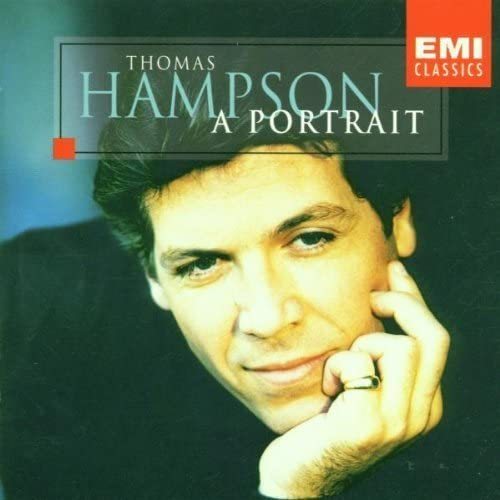
This is every Thomas Hampson CD cover ever.
Embarrassing confession: donkeys years ago I got this CD for free from EMI, because I wanted to hear one (one) track on it, and this is the first time I’m listening to the whole thing. I have owned this for 15 years.
This CD is typical Best Of fare by someone who has had a long and varied recording career with single label - the contents run the gamut from Wagner’s O du mein holder Aberstern to If I can’t love her from, erm, Beauty and the Beast. Yes, that Beauty and the Beast. With a friend we once concluded that Hampson is the ultimate Schwarzkopfian (the famous soprano once called him the best singer in Europe) - beautiful voice, excellent technique which has seen him through a long career, tends to get hammy. The live performance of Largo al factotum captured on this album certainly captures a singer savouring what he can do ;) This is a perfectly nice introduction to Hampson the artist, and has reminded me to go and listen to him more, just probably not this album again.
Favourite tracks: This is actually a tough call, as there are lots of goodies here. Roses of Picardy (no. 12), the song I got this for, is still great, as is Ich grolle night (11) from Dichterliebe. But, let’s go with the abovementioned Wagner (2).
A Portrait
Thomas Hampson, baritone
Geoffrey Parsons, piano
Various orchestras and conductors
2 notes
·
View notes
Text
61 Handel Arias
(Another mezzo, before we move on to something else.
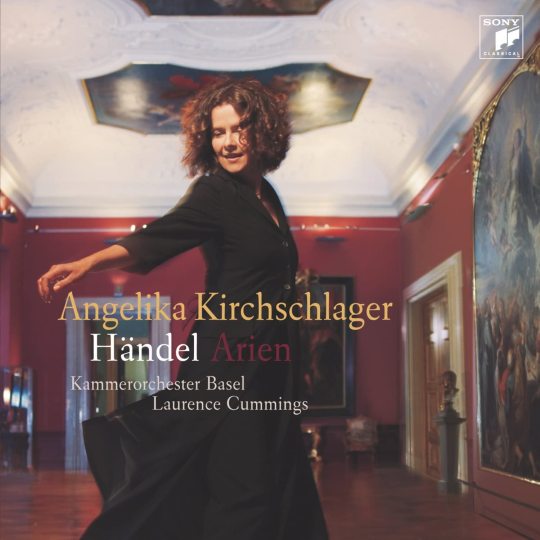
This cover is good.
Angelika Kirchschlager is another great singer who doesn’t ever get me super excited about anything, despite being very intelligent, elegant performer and compelling stage presence. This album is perfectly serviceable, but if someone else (not naming any names) did the exact same repertoire, I would choose that recording over this as my desert island Handel album - and therein lies the problem here: while lots of people might name Lorraine Hunt’s offering, or Sarah Connolly’s, or even Danielle DeNiese’s as their favourite Handel arias album, I doubt anyone would pick this.
There are arias from three Handel operas here - Ariodante, Giulio Cesare, and Arianna in Creta, which I don’t remember ever hearing of. Vocally, the three Sesto’s arias from GC are stronger than any of the Ariodante pieces; I don’t particularly enjoy the ornamentation of Scherza infida (which Angelika gender-swaps it to Scherzo), and Qui d’amor sounds a bit rushed. I enjoyed the Arianna numbers the best - nothing about them explains why this work is one of the more obscure ones, as the music is good, and sounds much less samey than some of the early Handel operas. Yes, the plot of the opera is a bit silly, but most of Handel’s plots are.
Favourite tracks: Cara speme (no. 6) is very good, but I’ll pick Salda Quercia (no. 10) from Arianna as my favourite.
Handel Arien
Angelika Kirchschlager, mezzo
Kammerorchester Basel
Laurence Cummings, conductor
0 notes
Text
60 Les Fantaisies
The last soprano for now!

So quirky!
Not entirely sure where I have picked this one up - I know Petibon only from a production of Handel’s Ariodante few years ago, and the cover isn’t exactly selling this to me (Petibon looks a bit too consciously like a character from a Jean-Pierre Jeunet movie to really be to my tastes), and there isn’t all that much on the programme that would immediately attract my attention either. A little bit of digging reveals that this is a Best Of collection, which accounts for the range of pieces - Barber’s adaptation of Quebecois carols chase Bernstein’s Le Bonne Cuisine, and Norman Dello Joio is followed by Handel and Caldara. The whole probably doesn’t work quite as well as the individual parts - Barber’s carols don’t particularly flatter Petibon’s voice (though she seems well suited to pretty much everything else on this album), and the two standalone pieces at the end (arias by Offenbach and Rameau) feel a bit superfluous after Caldara’s La passione di Gesù Cristo.
Favourite track: I loved Samuel Barber’s Melodies passageres to the texts by Rainer Maria Rilke (no. 5-9).
Les Fantaisies de Patricia Petibon
Patricia Petibon, soprano
Susan Manoff, piano
Various orchestras, ensembles and conductor
Available on Amazon, and on Spotify, where this is listed as “La bonne cuisine”.
0 notes
Text
59 Bellini & Verdi
Still on Spotify - the digital transfer of this album wasn’t great, the first set of music from Il Pirata cracking and hissing in various degrees. Boo.
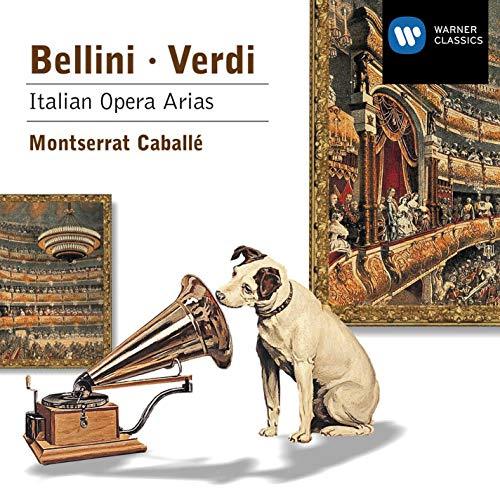
Not sure if this cover design has cropped up already or not - EMI used this for their low price re-releases in the 2000s; Warner has since repackaged this with a rather more attractive photo of Caballe in a 1970s polkadot dress in studio.
This ties into the previous entry neatly - the first three tracks are from a recording of Il Pirata Caballe and Marti did together in the 1960s, tho Marti is barely present here.
Now, if you scour the webs, you’ll discover this: there are lots of people who will tell you that Caballe had no business singing Bellini. She may have given the greatest ever performance of Casta Diva by anyone ever, but she really shouldn’t have touched Bellini. Maybe my ears are really unsophisticated or something, because all I can say is that it’s bollocks! - she admittedly doesn’t sound super excited about Il Pirata (does anyone), but her Elvira is just fine thankyouverymuch. I’ll give you this: the Bellini is fine, but the Verdi is great. Caballe was famous for her pianissimi (just google for evidence), and the album’s closing scene, Desdemona’s Willow song and Ave Maria really show that off.
Favourite track: let’s go with no. 8, Tu che le vanita from Verdi’s Don Carlo; it’s a great showcase for what Caballe could do, but also for what a difference a conductor (Carlo Maria Giulini) does - the 3min intro is just breathtaking too. Honorary mention to no. 10, Una macchia e qui tuttora! from Macbeth, which features a baby Sir Thomas Allen.
Bellini & Verdi - Italian Opera Arias
Montserrat Caballe, soprano
Carlo Maria Giulini, conductor
Riccardo Muti, conductor
Various orchestras
3 notes
·
View notes
Text
58 Zarzuela Arias and Duets
Zarzuela [θaɾˈθwela] Spanish operetta
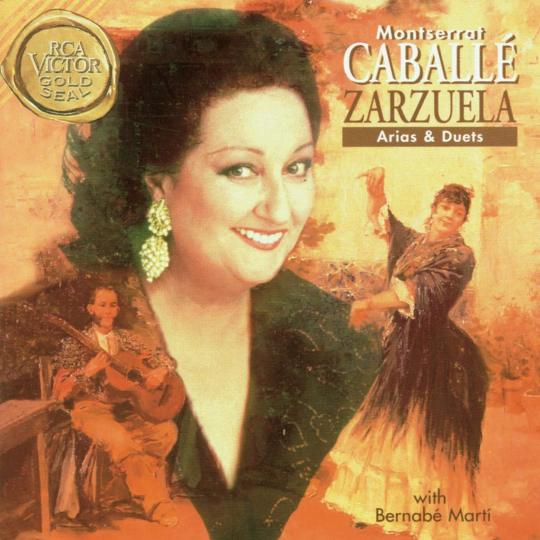
This album was released in 1995. Can’t you tell?
Hands up, who knew that Montserrat’s husband was a singer too? A good singer, who had a fairly successful international career of his own? Anyone?
Well, it’s true. Bernabe Marti, five years his wife’s senior (and surviving her), was already a seasoned veteran when they met in 1964 in A Coruña after he replaced Pinkerton in a production of Madama Butterfly she was singing in; they married the same year, and went on to perform and record together regularly. They also had two children, whom they named after themselves; Montserrat Marti is a modestly successful singer herself. Bernabe Marti suffered from health issues from the mid-1970s on, and retired after a heart attack in 1985. This collection of arias and duets from a selection of Spanish zarzuelas was recorded in two sessions the mid-1960s when they were still newlyweds, and Montserrat was just starting to became the superstar that she was. Marti sounds good, if slightly uneven; she sounds absolutely fantastic.
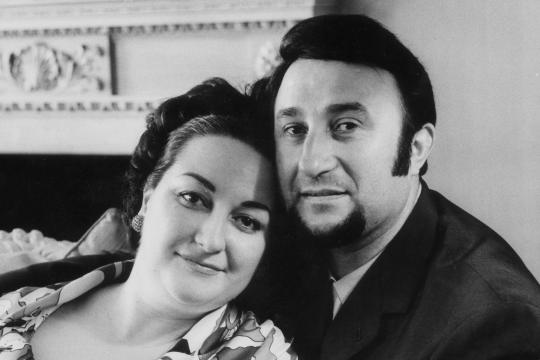
Aww.
Zarzuela is best described as operetta; regardles of style or the period they were written, they combine song, dance and spoken word, and the texts would contain hidden sex jokes and social commentary. They were popular during the 17th century, and then again from the 1860s onward, but declined after the Civil War, finally dying out in the 1950s. The music was often quite good, so for many Spanish opera singers zarzuela is sort of a compulsory part of their repertoire, and they survive in excerpts like this album. Much of the music sounds fairly similar, despite the fact that no two songs on this album are by the same composer.
Favourite track: No. 14, El Dúo de la Africana: Comprende lo grave de mi situación; this is a cracking tune.
Zarzuela Arias and Duets
Montserrat Caballe, soprano
Bernabe Marti, tenor
Eugenio Marco, conductor
0 notes
Text
57 A Lesson in Love

I’m not sure how many albums Royal’s EMI deal was for, but she managed to squeeze this third one in just before the label folded. I listened this to death when it first came out, and this is still very enjoyable, but listened to with intent hints of some vocal issues that aren’t in shape or sound present in the previous album, recorded two years prior.
This album is related in concept to the Lott/Kirschlager collab I listened to earlier - selection of songs by a variety composers, in several languages arranged into a cycle that narrates the story of a young woman first dreaming about love, then meeting her beloved and falling in love, giving her heart; where Lott and Kirschlager see their woman into widowhood through marriage and motherhood, Royal’s young woman reaches maturity through the betrayal of her lover, the cycle opening and closing with the same song, Bolcom’s Waitin’ from his Cabaret Songs. This is an intelligent, elegant programme, even if all of the songs don’t flatter Royal’s voice - in some of the songs the top sounds a bit shrill, which may have something to do with the tempi; it’s a long programme at 29 songs, but I wish a bit more time had been taken with some of them.
Favourite track: I have a few - Beach’s Ah, Love, but a day (14) is great, as are Copland’s Heart, we will forget him! (26), and the plainly beautiful Danny Boy (27). The second version of Bolcom’s Waitin’ is lovely too (29).
A Lesson in Love
Kate Royal, soprano
Malcolm Martineau, piano
0 notes
Text
56 Midsummer night
One of my personal favourites coming up!
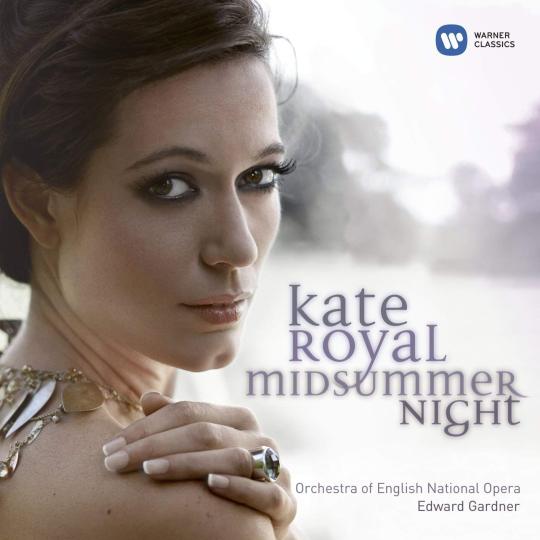
The heart wants what the heart wants: I’ll take Kate Royal and her smallish, fine, silvery voice over Netrebko’s any time, and you can’t change my mind. This album has become hugely personal to me not just because of her, but because this is just a cracking selection of music. And also because this guest stars Sir Thomas Allen.
Royal got her start, like many English singers, in the Glyndebourne Festival Chorus; she was selected to understudy for Pamina in Mozart’s Magic Flute, and got her break stepping in for one performance; she has since returned to sing, among other things, the Marschallin in the Rosenkav and the Governess in Britten’s Turn of the Screw. She was signed by EMI early on, and did three solo recordings for the label before it folded in 2012(*, including this one to critical acclaim. After that promising start, Royal’s professional fortunes have fluctuated; she seems to perform irregularly, and has gone through some poorly defined vocal crises over the years. Whenever I have caught her live, she has been nothing but riveting - an intense performer and strong stage presence, always in command of intelligently chosen repertoire.
And that’s what this album is (apart from maybe the Lehar; it’s a perfectly great performance, but in the whole it sort of pokes out a bit) - an intelligently chosen repertoire consisting mostly of lesser known pieces from 20th century operas, opening with titular Midsummer Night, O, night of magic from William Alwyn’s Miss Julie, and including arias from Walton’s Troilus and Cressida, Floyd’s Susannah, Messager’s Monsieur Beaucaire, and Herrmann’s Wuthering Heights. Why so many of these pieces are rarely performed is a mystery - they are ravishingly beautiful, and in this arrangement create a whole that is larger than sum of its parts, a haunting narrative of rapture and disappointment in love.
Favourite tracks: I have a few - no.1, Midsummer night, is ecstatic, rapturous expression of the character’s longing for freedom; I also particularly love no.8, Do not utter a word from Barber’s Vanessa, and no. 12, I have dreamt in my life dreams from Herrmann’s Wuthering Heights.
Midsummer Night
Kate Royal, soprano
The Orchestra of the ENO
Crouch End Festival Chorus
Edward Gardner, conductor
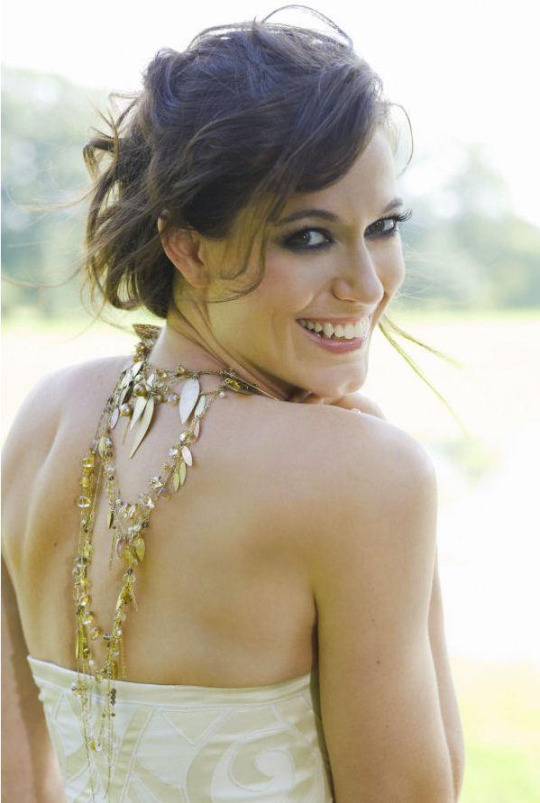
*) The EMI Classics label was created in 1990 to incorporate a number of smaller labels such as Erato and HMV and bring them under one trademark. When EMI folded, the classical music back catalogue was sold to Universal, who sold it to Warner Music, who released some of it under their own label in the midprice. I heard few years ago (over a dinner in an Oxford college) that at EMI had destroyed much of their classical music archive, including huge quantities of unreleased masters by some of their earliest recording artists, in a true crime against the art.
0 notes
Text
55 Portraits
Moving on to full-on cheating: the next disc was supposed to be a Best of -collection by Magda Olivero called portraits. Spotify, it turns out, doesn’t have it, but it has a few others, all of which have the same tracks but in different order, so that’s what I’m listening to.

To me this cover promises so much more than the contents deliver.
I think I picked this CD up from a charity shop for 50p. I had never heard of the singer but I liked that list of composers, and the photo made me for some reason think that Olivero might be a dark-voiced mezzo. Spoiler: she isn’t. To my year she has one of those slightly old-fashioned, clear as bell sopranos that I am not super keen on. According to various obituaries (she died 6 six years ago at the age of 104), Olivero enjoyed a very long career but always sort of remained the also-ran, recording very little and never attracting the same attention as the big divas of her heyday (that is, Callas and Tebaldi). Much of what is available by her now is pirated from live performances. She did record a small selection of pieces from her core repertoire over a 20-year period, and this album has been cut together from those tapes. The Spotify alternative is called Vocal Recital, or La leggenda di Magda Olivero:

Favourite track: Boito’s L’altra notte in fondo al mare. Not quite Montserrat level, but pretty darn good.
Portraits
Magda Olivero, soprano
0 notes
Text
54 Era la notte
Here’s another whiplash turn in style and substance.

Goddess.
Anna Caterina Antonacci is anomalous. She’s insanely beautiful, an intense, charismatic performer, and generally much loved by all; her voice has gone from mezzo to soprano and back, and at times she has suffered vocal issues bad enough to make poeple think she’s finished, only to bounce back better than ever. Her most famous stage roles are Carmen and Cassandra in Les Troyens, and in the last couple of years she has gained fame as Queen Elizabeth I in Britten’s Gloriana. At her best, she’s the best. At her worst, she’s still morbidly interesting. And she often sings Moon River as an encore. As one does.

If Antonacci’s stage career is varied and eclectic, her two studio solo recordings are similar in style and period - baroque lamenti (this one) and arias sandwiched between orchestral pieces (the other one). Back in 2006 when this album was released, it was considered enough of an occasion for Gramophone to make it their cover feature, which inspired me to buy this. I was more seduced by Antonacci’s Fellini movie-esque beauty (she’s seriously ravishing) than by the repertoire on this album, but it has grown on me while my own tastes have shifted.
She’s in ravishing voice here, and the performance is beautifully judged to fit the music she’s performing. Everything is well balanced. In short, this is a small, perfect gem.
Favourite track: There are only four.
Era la notte
Anna Caterina Antonacci, soprano
Modo Antiquo
Federico Maria Sardelli, conductor
Available on Spotify.
0 notes
Text
53 Russian Album
The Netrebko tour comes to an early end with a return to (her) beginning.

The DG publicity dept has really been kind to Anna. This too is pretty on point.
As recounted earlier, Netrebko got her professional start with Gergiev in the Mariinsky in St Petersburg, so this album appearing on the heel of the previous Sempre Libera was pretty logical step to take for her. The album closes with the letter scene from Eugene Onegin; Tatiana being the role probably everyone thinking she was born to sing (I don’t think she did before 2012, but I may be wrong). The rest is combination of arias and scenes from lesser known Russian operas, with few songs scattered in between. There’s again a mystery Puccini encore chasing the Letter scene, O soave fanciulla with Villazon, but I think that’s just Spotify being weird, as it’s not listed on the CD booklet.
This is another album that is just fine, without anything poking out to any direction, or sung with much audible passion. The repertoire fits Netrebko’s voice the best of anything she had done up to this point, bringing out the darkness of it much more. Maybe Tatiana was vocally pushing it a bit at this point, but the rest is more or less as it should. Is Netrebko as interesting an artist in this repertoire as, say, Galina Vishnevskaya? Probably not, but who is?
Favourite track: I like the Prologue from Rimsky-Korsakov’s Snow Maiden (no. 5), and the aria from The Tsar’s Bride (no. 7) the best.
Russian Album
Anna Netrebko, soprano
The Orchestra of the Mariinsky Theatre
Valeri Gergiev, conductor
2 notes
·
View notes
Text
52 Sempre libera
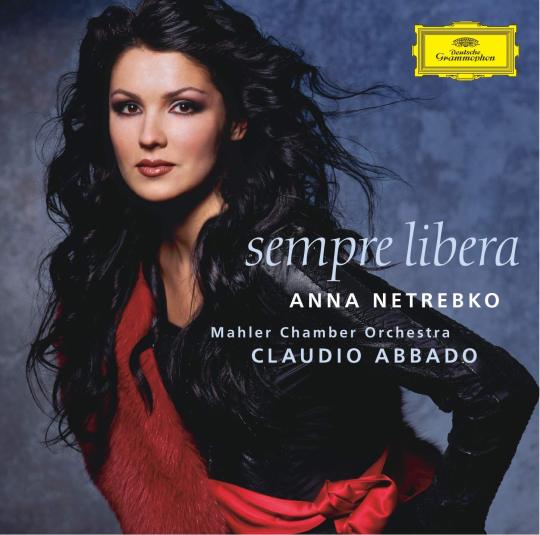
Another great, well aged cover.
This is Netrebko’s second album, and much better value as an introduction to her than her first. She was around the time of the release starting to make the sort of waves that capsize ships, particularly for her Violetta, and this hits it right there. Only four tracks out of 17 are actually Verdi; Violetta and Desdemona bookend a selection of the greatest bel canto hits by Bellini and Donizetti, from La Sonnanbula to Lucia di Lammermoor. The album closes with O mio babbino caro, which feels like the encore that doesn’t quite go with the actual recital - it’s a stunning performance, but I would have probably dropped it from the album anyway.
The two arias from Traviata are actually less interesting than the rest of the album, including the two Otello arias in the end. I’m also not super into the I Puritani numbers either - the coloratura runs are not very strong, and it all lacks certain precision. Overall, this is a very easy, pleasant to listen to, album. Nothing is super bad, but while this sounds beautiful (the Slavic hollowness is much less obvious in this than it was in the first album), there’s that same lack of sparkle here - maybe my initial judgment that Netrebko doesn’t 100% translate to recording, at this point of her career at least, stands?
Favourite track: No. 4, Ah, non credea mirarti (in duet with Saimir Pirgu) is stunning. I also do really enjoy the extraneous Puccini in the end ;-)
Sempre Libera
Anna Netrebko, soprano*
Mahler Chamber Orchestra
Claudio Abbado, conductor
*Uncredited on the cover, but appearing on the disc, are also tenor Saimir Pirgu, and contralto Sara Mingardo
Available on amazon and spotify, and probably every record store selling classical music.
0 notes
Text
51 Opera Arias
And then, something entirely different.

This cover is gorgeous, and has aged well.
Netrebko is, along with Kauffman, the biggest star singing today, with all the appropriate hoopla surrounding her - people truly either love her or hate everything about her. I saw her in the ROH Macbeth, and thought she sounded a lot better live than on CD, and I loved the mid-00s minimalist Traviata she did with Rolando Villazon, but have been largely indifferent to her otherwise, probably because I’m not hugely into the repertoire she sings.
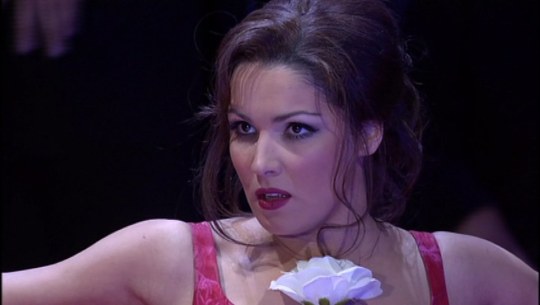
There’s lore - Trebs was “discovered” while sweeping the floors of the Mariinsky Theatre, presumably while singing Happy Working Song, and became a star overnight because she could sing like a Disney princess and was also hawt. Which is about 20% true - while studying in the conservatory, she made pocket money janitoring in the theatre, and the musical director Valeri Gergiev recognised her when she officially auditioned for them. She did rise to fame pretty fast, and being pretty probably helped (it of course follows that lots of people never forgave her when she gained weight while pregnant, and didn’t immediately snap back to her pre-baby body - the fandom can be the worst), as did being a natural performer. Her voice has that same vaguely Slavic hollowness I mentioned when listening to Kasarova, which I think is something to do how their respective native languages “sit” in the mouth, and it doesn’t always sound super attractive to me; Netrebko’s voice has grown bigger and darker with age, probably taking her to directions she didn’t expect to go starting out as Susanna in Figaro.
This album isn’t super impressive, and a bunch of that has nothing to do with Netrebko - the sound quality is uneven (it sounds a bit like it was recorded in a number of different venues, which have different acoustics, which I don’t think was actually the case), and in the first couple of tracks her voice sort of disappears into the fabric of the sound. The selection of music is also a bit all over the place - there’s Mozart, there’s Puccini, there’s some bel canto, there’s some French stuff, and not all of it succeeds in showing a young singer’s (as an aside, Netrebko is 32 here, three years older than Jones in her debut below) voice as its most promising best. The haters will point out how bad and poorly suited she is to bel canto, but on this album the Bellini and Donizetti, along with the Massanet, work the best. The biggest problem for me is probably some hard to define lack of spirit tho - much of this is very accomplished, but just doesn’t sparkle in the way you’d expect.
Favourite track: No 4, Obéissons quand leur voix appelle from Manon; she sounds great here. I’m also a fan of Rusalka’s Song to the moon (no. 8).
Opera Arias
Anna Netrebko, soprano
Wiener Philharmoniker
Gianandrea Noseda, conductor
0 notes